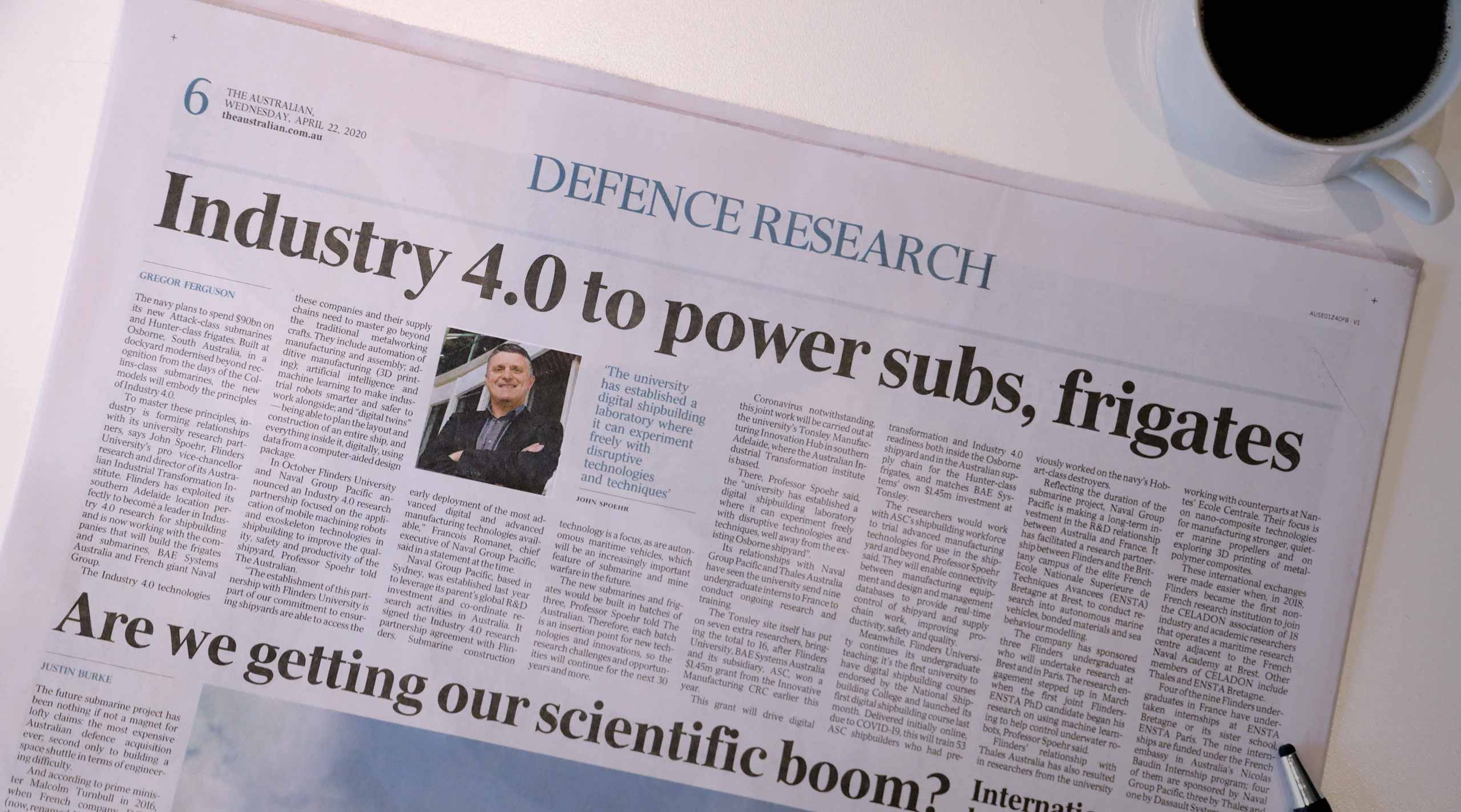The Australian, Wednesday, April 22, 2020
theaustralian.com.au
Gregor Ferguson
The navy plans to spend $90bn on its new Attack-class submarines and Hunter-class frigates. Built at Osborne, South Australia, in a dockyard modernised beyond recognition from the days of the Collins-class submarines, the new models will embody the principles of Industry 4.0.
To master these principles, industry is forming relationships with its university research partners, says John Spoehr, Flinders University’s pro vice-chancellor research and director of its Australian Industrial Transformation Institute. Flinders has exploited its southern Adelaide location perfectly to become a leader in Industry 4.0 research for shipbuilding and is now working with the companies that will build the frigates and submarines, BAE Systems Maritime Australia and French giant Naval Group.
The Industry 4.0 technologies these companies and their supply chains need to master go beyond the traditional metalworking crafts. They include automation of manufacturing and assembly; additive manufacturing (3D printing); artificial intelligence and machine learning to make industrial robots smarter and safer to work alongside; and “digital twins” being able to plan the layout and construction of an entire ship, and everything inside it, digitally, using data from a computer-aided design package.
In October Flinders University and Naval Group Pacific announced an Industry 4.0 research partnership focused on the application of mobile machining robots and exoskeleton technologies in shipbuilding to improve the quality, safety and productivity of the shipyard, Professor Spoehr told The Australian. “The establishment of this partnership with Flinders University is part of our commitment to ensuring shipyards are able to access the early deployment of the most advanced digital and advanced manufacturing technologies available,” Francois Romanet, chief executive of Naval Group Pacific, said in a statement at the time.
Naval Group Pacific, based in Sydney, was established last year to leverage its parent’s global R&D investment and co-ordinate research activities in Australia. It signed the Industry 4.0 research partnership agreement with Flinders. Submarine construction technology is a focus, as are autonomous maritime vehicles, which will be an increasingly-important feature of submarine and mine warfare in the future.
The new submarines and frigates would be built in batches of three, Professor Spoehr told The Australian. Therefore, each batch is an insertion point for new technologies and innovations, so the research challenges and opportunities will continue for the next 30 years and more.
Coronavirus notwithstanding, this joint work will be carried out at the university’s Tonsley Manufacturing Innovation Hub in southern Adelaide, where the Australian Industrial Transformation institute is based.
There, Professor Spoehr said, the “university has established a digital shipbuilding laboratory where it can experiment freely with disruptive technologies and techniques, well away from the existing Osborne shipyard”. Its relationships with Naval Group Pacific and Thales Australia have seen the university send nine undergraduate interns to France to conduct ongoing research and training.
The Tonsley site itself has put on seven extra researchers, bringing the total to 16, after Flinders University, BAE Systems Maritime Australia and its subsidiary, ASC, won a $l.45m grant from the Innovative Manufacturing CRC earlier this year.
This grant will drive digital transformation and Industry 4.0 readiness both inside the Osborne shipyard and in the Australian supply chain for the Hunter-class frigates, and matches BAE Systems’ own $1.45m investment at Tonsley.
The researchers would work with ASC’s shipbuilding workforce to trial advanced manufacturing technologies for use in the shipyard and beyond, Professor Spoehr said. They will enable connectivity between manufacturing equipment and design and management databases to provide real-time control of shipyard and supply chain work, improving productivity, safety and quality.
Meanwhile, Flinders University continues its undergraduate teaching; it’s the first university to have digital shipbuilding courses endorsed by the National Shipbuilding College and launched its first digital shipbuilding course last month. Delivered initially online, due to COVID-19, this will train 53 ASC shipbuilders who had previously worked on the navy’s Hobart-class destroyers.
Reflecting the duration of the submarine project, Naval Group Pacific is making a long-term investment in the R&D relationship between Australia and France. It has facilitated a research partnership between Flinders and the Brittany campus of the elite French Ecole Nationale Superieure de Techniques Avancees (ENSTA) Bretagne at Brest, to conduct research into autonomous marine vehicles, bonded materials and sea behaviour modelling.
The company has sponsored three Flinders undergraduates who will undertake research at Brest and in Paris. The research engagement stepped up in March when the first joint FlindersENSTA PhD candidate began his research on using machine learning to help control underwater robots, Professor Spoehr said.
Flinders’ relationship with Thales Australia has also resulted in researchers from the university working with counterparts at Nantes’ Ecole Centrale. Their focus is on nano-composite technologies for manufacturing stronger, quieter marine propellers and on exploring 3D printing of metalpolymer composites.
These international exchanges were made easier when, in 2018, Flinders became the first nonFrench research institution to join the CELADON association of 18 industry and academic researchers that operates a maritime research centre adjacent to the French Naval Academy at Brest. Other members of CELADON include Thales and ENSTA Bretagne.
Four of the nine Flinders undergraduates in France have undertaken internships at ENSTA Bretagne or its sister school, ENSTA Paris. The nine internships are funded under the French embassy in Australia’s Nicolas Baudin Internship program; four of them are sponsored by Naval Group Pacific, three by Thales and one by Dassault Systemes.
